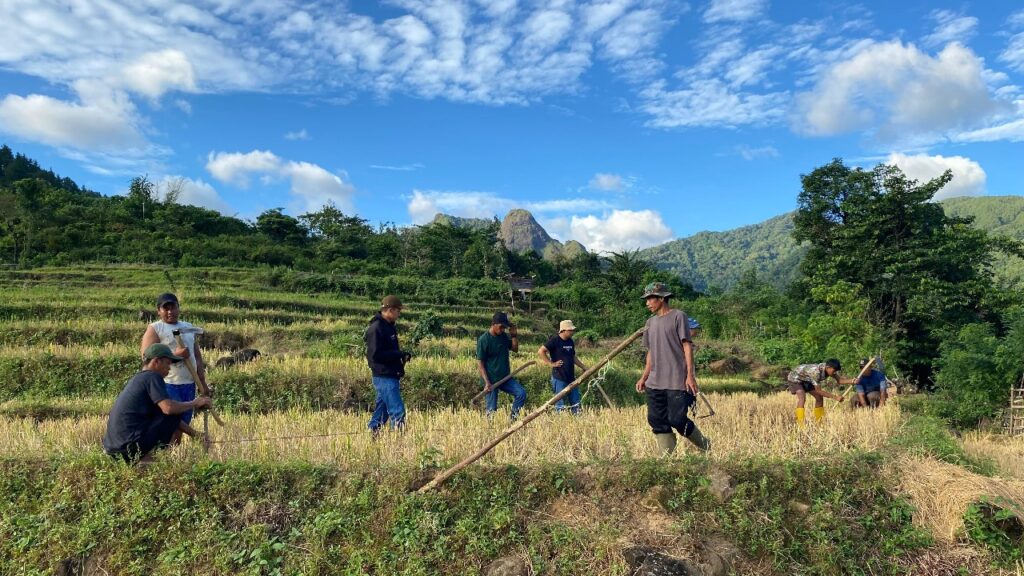March to June, Field School activities initiated by the Estungkara & SCF program in Maros Regency have shown impressive results. This activity not only provides new knowledge to farmers. But also embracing local wisdom and existing traditional practices. This initiative involves indigenous communities in Bonto Manurung Village and Bonto Somba Village. With a primary focus on the transition from the use of chemicals to organic materials in composite corn cultivation.
In March, the process of identifying potential participants began with clear criteria: innovative, consistent and inclusive farmers. These criteria aim to create an inclusive and sustainable learning atmosphere. As well as responding to the challenge of changing habits from the use of chemicals to organic materials through the agrosilvopasture system. After the identification process, twenty farmers from Bonto Somba Village and twenty farmers from Bonto Manurung Village were selected who were ready to take part in field school activities.
The agrosilvopastura system, according to B Huber (2020), is an integration between agricultural (agro), forestry (silvo) and livestock (pastura) practices. In Bonto Manurung Village and Bonto Somba Village, this system is implemented with the aim of increasing land productivity and farmer welfare. Below are three inspiring stories from Field School participants that demonstrate the application of this system.
Pak Maman, or Dg Sore, is a 50 year old farmer who has only received a basic education. After migrating for 10 years, he returned to Bonto Manurung Village to cultivate his land. Pak Maman's land consists of rice fields, peanut, pepper and cocoa plantations. He also has 12 cows which he grazes on special land planted with elephant grass.
Pak Maman is one of the farmers who is very enthusiastic about participating in the Field School. Even though he was initially unfamiliar with the term agrosilvopasture, he was curious and enthusiastic to learn about it. While attending Field School, Pak Maman began to rely on several cows and used cow dung to make organic fertilizer. The aim is to reduce dependence on chemical fertilizers.
Daeng Ali's family suffered heavy losses from the corn harvest in April. Their two hectare land has lost fertility due to long-term use of chemical fertilizers. Fluctuating corn selling prices also exacerbate their losses.
Learning from this bitter experience, Iwan, Daeng Ali's youngest son, started relying on their cows and using elephant grass as animal feed. He also took the initiative to make organic fertilizer from local ingredients. Mrs. Ina, Daeng Ali's first child, also participated by growing vegetables which were used to make vegetable pesticides. The Field School gives Daeng Ali's family new hope to become more independent in managing their land.
Five farmers from Bara Hamlet, Bonto Somba Village, participated in the Field School even though access to their hamlet was very difficult. Bara Hamlet is famous for its high quality brown sugar tapped from sugar palm trees. Farmers from Bara Hamlet contributed by providing brown sugar to make MOL (Local Micro Organism) based organic fertilizer. Brown sugar helps the decomposition process of organic materials, improving the quality of fertilizer used by farmers.
Field Schools in Maros Regency are not only about knowledge transfer, but also about reviving sustainable and inclusive agricultural practices. The agrosilvopasture system has been proven to be effective in increasing farmer productivity and welfare. This program also proves that collaboration between modern knowledge and local wisdom can create innovative and sustainable solutions.
Through inspiring stories from Pak Maman, Daeng Ali's family, and farmers from Bara Hamlet, we see how a spirit of learning and collaboration can bring positive change. The Field School and the Estungkara & SCF program have given new hope to farmers in Maros Regency. Helping them become more independent and competitive in managing their agricultural land.
The Field School in Maros Regency is a clear example of how inclusive and sustainable programs can bring positive change in people's lives. By combining modern knowledge and local wisdom, farmers not only learn about new techniques but also how to conserve and better utilize natural resources. The stories from Field School participants provide inspiration and hope that sustainable agriculture is not only possible but can also be achieved with hard work and collaboration.


